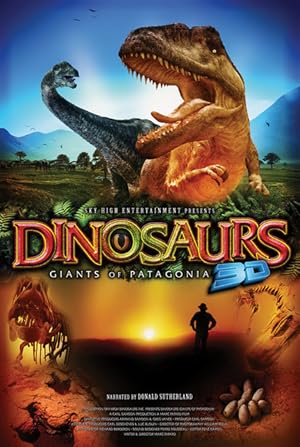
Dinosaurs: Giants of Patagonia Page #3
Flying reptiles reach their apogee
with the Quetzalcoatlus, the
pterosaur as wide as a small plane.
No flying bird will ever
get as big, not even close.
Apart from flight, this reptiles
has nothing in common with birds
And evolution gave it nothing to
survive the impending dramatic events.
Several factors could have
contributed to the demise of dinosaurs.
Mammals became bigger
and more competitive.
Drifting isolated continents
touched each other.
New rivalries appeared.
New diseases spread.
The climate was growing colder,
possibly because of
increased volcanic activity.
Five million years before
the end of the dinosaur era,
the volcanoes of the world
became much more active.
The air was
unbreathable in many places.
Vegetation suffered from the acid rain
and also from the
darkened and dust-filled skies.
But still, many
dinosaurs made it through
for a little while longer.
This comet is
as big as Mount Everest.
It covers the distance from
the moon to the Earth in two hours.
It cuts through our atmosphere
in two seconds.
It hit the earth near today's
Yucatan Peninsula in Mexico.
South America are destroyed by fire.
Already weakened, dinosaurs are
the animals that suffered most.
If they don't die as a result of the
impact and its immediate consequences,
they will die gradually in the aftermath.
In a relatively short time,
dinosaurs become history.
Or did they?
Not all the dinosaurs disappear.
Birds are dinosaurs.
It's difficult to imagine
how mammals could have evolved
alongside large dinosaurs.
If they haven't become extinct
maybe we just wouldn't be here.
Instead, when we
look at birds of today
it's as if the dinosaurs have left
us only the grace and beauty.
Palaeontology takes me fantastic
places all over the planet.
Still it keeps bringing
me back to my roots,
here in Patagonia.
More discoveries await me here perhaps
but as I move forward in life,
I find as much meaning
in sharing knowledge
as in discovering new dinosaurs.
This said, I'm not that old.
Translation
Translate and read this script in other languages:
Select another language:
- - Select -
- 简体中文 (Chinese - Simplified)
- 繁體中文 (Chinese - Traditional)
- Español (Spanish)
- Esperanto (Esperanto)
- 日本語 (Japanese)
- Português (Portuguese)
- Deutsch (German)
- العربية (Arabic)
- Français (French)
- Русский (Russian)
- ಕನ್ನಡ (Kannada)
- 한국어 (Korean)
- עברית (Hebrew)
- Gaeilge (Irish)
- Українська (Ukrainian)
- اردو (Urdu)
- Magyar (Hungarian)
- मानक हिन्दी (Hindi)
- Indonesia (Indonesian)
- Italiano (Italian)
- தமிழ் (Tamil)
- Türkçe (Turkish)
- తెలుగు (Telugu)
- ภาษาไทย (Thai)
- Tiếng Việt (Vietnamese)
- Čeština (Czech)
- Polski (Polish)
- Bahasa Indonesia (Indonesian)
- Românește (Romanian)
- Nederlands (Dutch)
- Ελληνικά (Greek)
- Latinum (Latin)
- Svenska (Swedish)
- Dansk (Danish)
- Suomi (Finnish)
- فارسی (Persian)
- ייִדיש (Yiddish)
- հայերեն (Armenian)
- Norsk (Norwegian)
- English (English)
Citation
Use the citation below to add this screenplay to your bibliography:
Style:MLAChicagoAPA
"Dinosaurs: Giants of Patagonia" Scripts.com. STANDS4 LLC, 2025. Web. 22 Feb. 2025. <https://www.scripts.com/script/dinosaurs:_giants_of_patagonia_6942>.






Discuss this script with the community:
Report Comment
We're doing our best to make sure our content is useful, accurate and safe.
If by any chance you spot an inappropriate comment while navigating through our website please use this form to let us know, and we'll take care of it shortly.
Attachment
You need to be logged in to favorite.
Log In